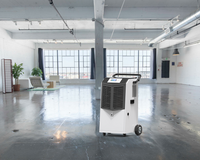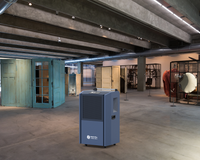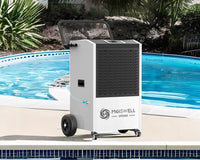Finding the perfect commercial dehumidifier for your space is essential to maintain a comfortable and healthy environment. Excess humidity can lead to various issues in commercial settings, including mold growth, equipment damage, and decreased productivity. In this article, we'll guide you through the process of selecting the right commercial dehumidifier for your specific needs. By considering factors such as size, capacity, and additional conditions, you can make an informed decision and optimize the air quality in your business space.
How to Determine the Size of a Commercial Dehumidifier?
To determine the appropriate size of a commercial dehumidifier, you need to consider the cubic footage of the area you want to dehumidify. Measure the length, width, and height of the space and multiply these dimensions to calculate the total cubic footage. Once you have the cubic footage, use the following guidelines to determine the required capacity:
1. Small Spaces (2,500 to 5,000 cubic feet): Opt for a dehumidifier with a capacity of 50 to 70 pints per day.
2. Medium Spaces (5,000 to 10,000 cubic feet): Select a dehumidifier with a capacity of 70 to 100 pints per day.
3. Large Spaces (over 10,000 cubic feet): Consider a dehumidifier with a capacity of over 100 pints per day or multiple units for efficient dehumidification.
Find the Right Commercial Dehumidifier.
Consider the following factors when choosing a commercial dehumidifier:
1. Extraction Rate: Look for a dehumidifier with an extraction rate that matches the moisture load of your space. Higher extraction rates are ideal for areas with excessive moisture or high humidity levels.
2. Operating Temperature Range: Ensure that the dehumidifier can function effectively within the temperature range of your space. Some units are designed for colder environments, while others are suitable for warmer conditions.
3. Drainage Options: Determine the most suitable drainage option for your space. Manual draining, gravity drainage, or built-in pumps are common options to consider, depending on the layout and accessibility of your area.
4. Energy Efficiency: Look for energy-efficient models to minimize operating costs. ENERGY STAR-certified dehumidifiers or units with adjustable fan speeds and programmable timers can help optimize energy usage. 5. Noise Level: Consider the noise level of the dehumidifier, especially if it will be placed in a customer-facing area or where noise sensitivity is a concern. Look for units with lower decibel ratings for quieter operation.
Additional Conditions to Consider.
1. Humidity Control: Determine if you require precise humidity control. Some units feature built-in humidistats or hygrometers that allow you to set specific target humidity levels.
2. Air Filtration: If air quality is a concern, consider dehumidifiers with built-in air filtration systems. These units can help remove allergens, dust, and odors from the air, improving overall indoor air quality.
3. Durability and Warranty: Assess the durability of the dehumidifier and the warranty offered by the manufacturer. Look for units with robust construction and reliable components to ensure long-lasting performance.
Selecting the right commercial dehumidifier is crucial to maintaining a comfortable and healthy environment in your business space. Consider the size and capacity based on the cubic footage of your area, assess factors such as extraction rate.





